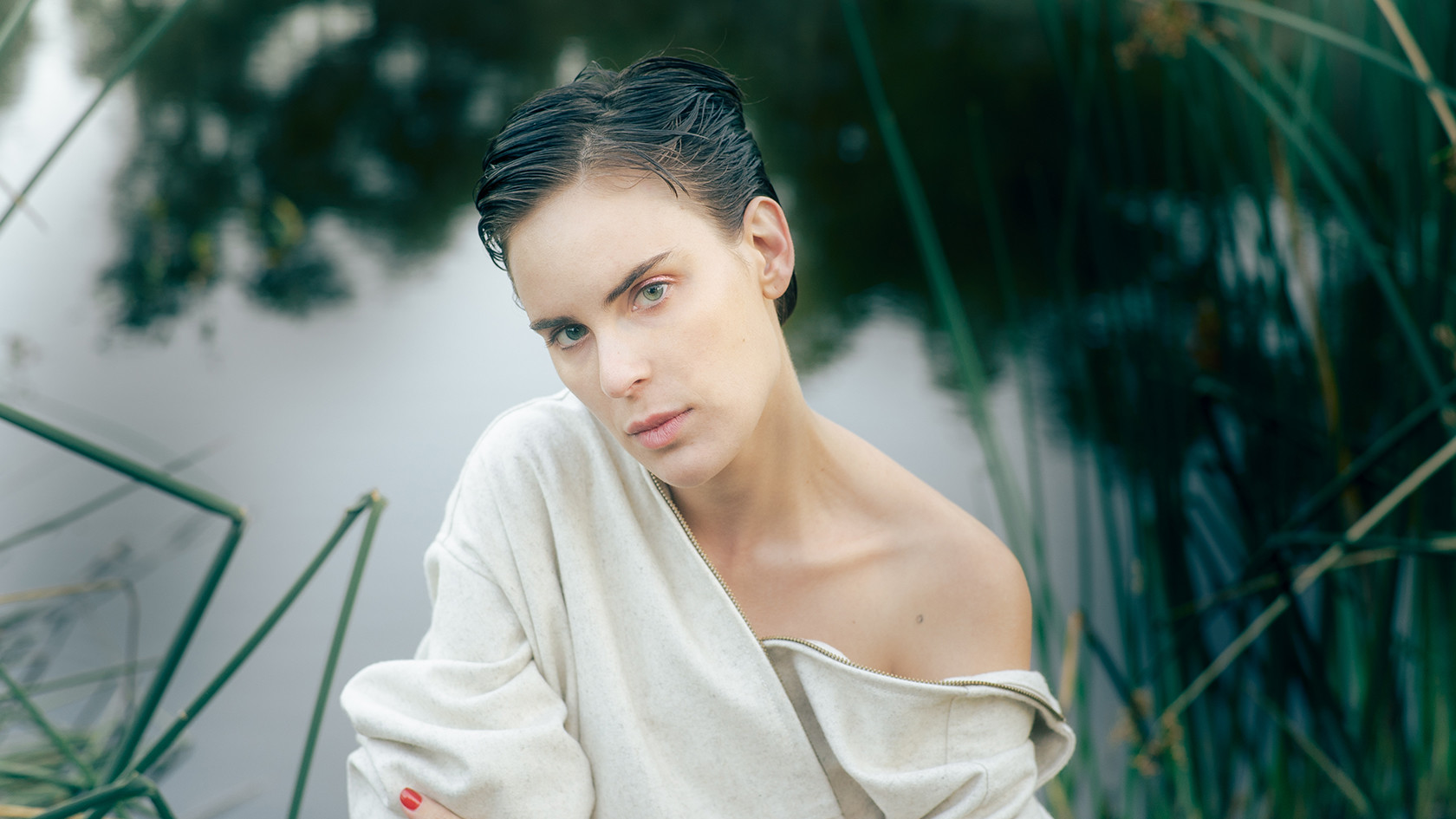
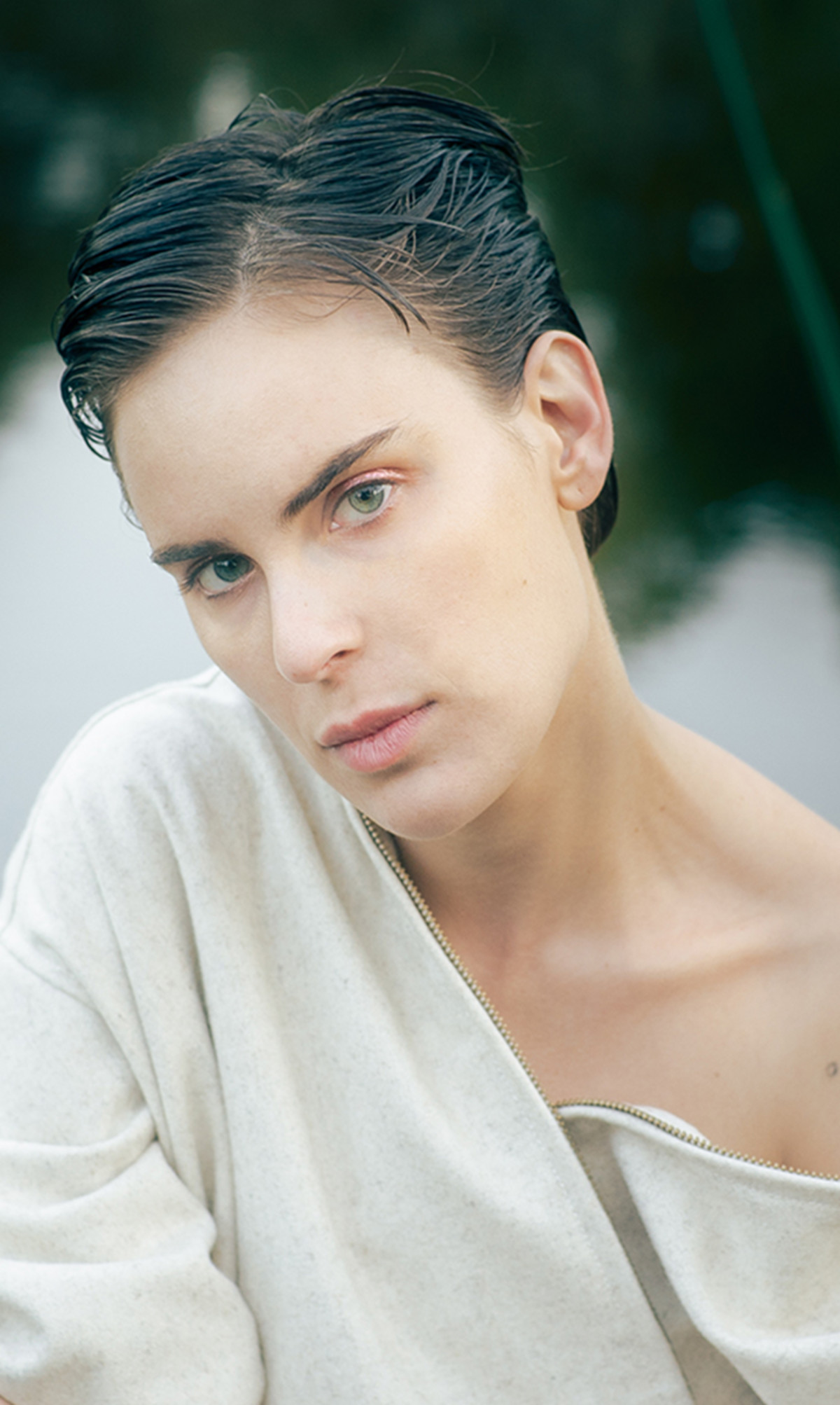


Will Power
PHOTOS BY DILLON BUSS WORDS BY TAMARA RAPPA
With Untethered Authenticity Artist, Mental Health Advocate, And Millenial Voice For Sobriety Tallulah Willis Creates A Thoughtful Collection and One-Of-A-Kind Vision with Wyllis
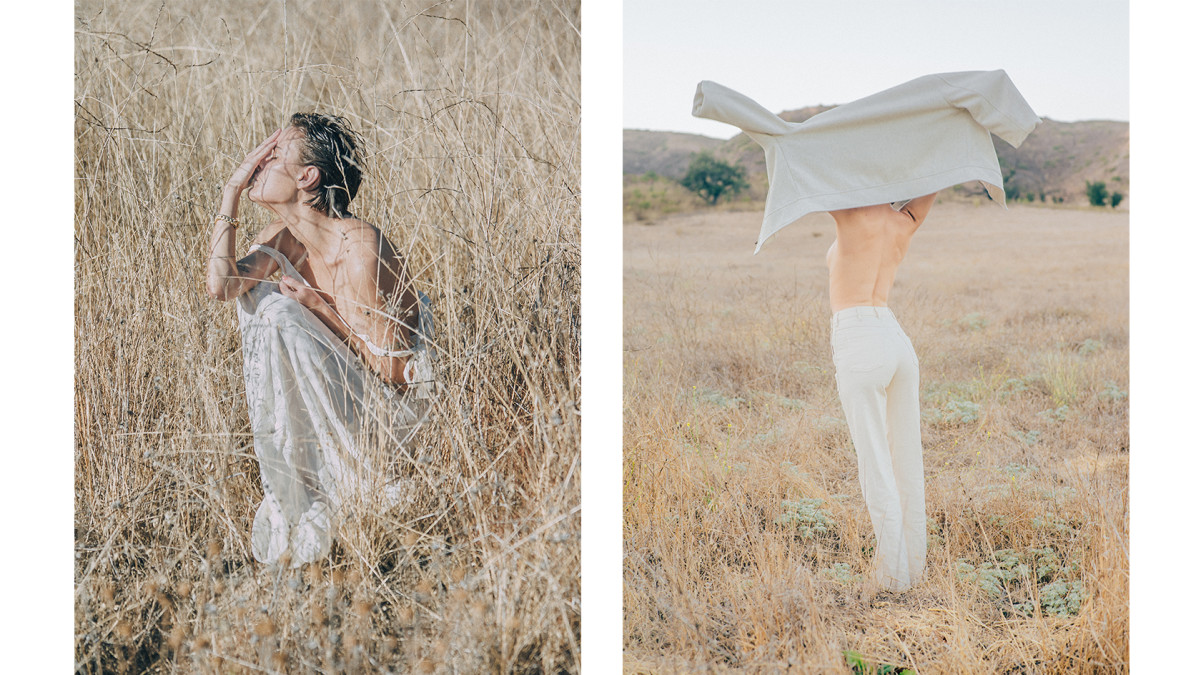
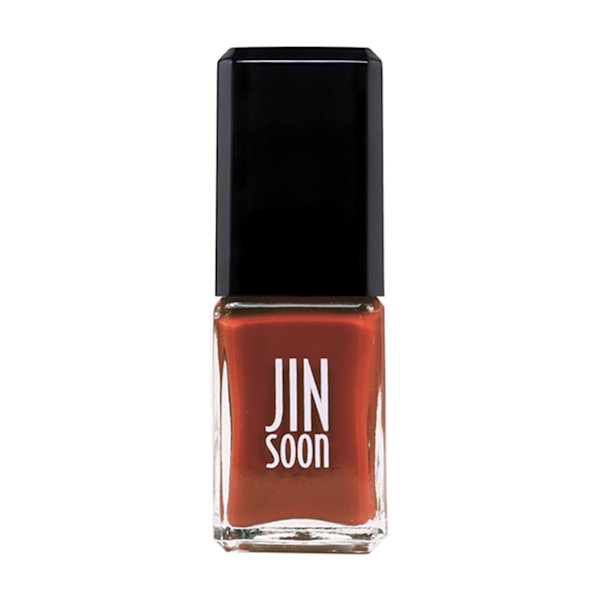
ABOVE PHOTO: Wyllis Jacket. LEFT: Wyllis Dress; 14K Gold Bracelet, Tallulah's own. RIGHT: Wyllis Jacket and Pant; Tallulah is wearing JINsoon Nail Polish in Idyll throughout.
Listen to the extended interview on episode 55 of the Story + Rain Talks podcast. Available on Apple Podcasts, Spotify, and Soundcloud.
Tallulah Willis: I'm sitting with my pups on the couch. We just had a great lunch. We did a photo shoot; it was a short little shoot. We got this model that we'd been wanting to work with for a while. She was available, so we just booked it. She was amazing. Her name is Lulu.
Tamara Rappa: I love the diversity in models that you use, and your inclusive sizing. I'm considered kind of the creative person in my family, and you grew up surrounded by creatives. What was that like? Can you recall a distinct memory of being deeply immersed in a creative moment as a child?
TW: Oh, wow. Great question. I think it's hard to pinpoint one creative overarching moment. I think there was constant creativity. I do have one memory that is sort of flashing into my mind for some reason. When I was in, I want to say first or second grade, we were doing a project in Spanish class where we each had to be an animal and you would dress up that day, for your presentation. I was a duck. You were supposed to make your costume at home. I was expecting paints, white, a bill, kind of like Donald Duck. My mom was like, "No, no, no," and came up with this insane feathered Mardi Gras mask, and these silk, almost handkerchief-edged drapey things, and fitted me to be this fancy girl-haute couture, duck.
TR: Reinterpreted the duck costume...
TW: Reinterpreted the duck costume. That was the kind of energy. There were always real work projects going on, but it was those little moments of creativity that I think really stuck with me, and helped grow my own aesthetic. The flip side of that, is that I grew up with both of my sisters who are really talented singers and really beautiful writers and visual artists--- they have a lot of innate gifts. There was a little bit of me being the youngest, and kind of seeing a lot of people in already-developed stages of creativity. There was pressure, not spoken, but pressure that I put on myself to kind of figure it out. I knew I wanted to do something creative. I knew I had this spark in me. I knew I wanted to create something. But what is it? My desires, skills, and hobbies...didn't feel as clear. It didn't rest in "I sing". Or, "I do visual art." It required finessing. I think that's why Wyllis came to be in my later twenties, because it took a long time to isolate what I loved. Then once I figured it out it was like, "How do I this?"
“There was a little bit of me being the youngest, and kind of seeing a lot of people in already-developed stages of creativity. There was pressure, not spoken, but pressure that I put on myself to kind of figure it out.”
TR: Your boyfriend, Dillon, who shot our cover story featuring you, is a director and a photographer---another creative in your life. How do you inspire one another? Because I know that you do.
TW: My God, yeah. Dillon moved in about two months ago. Sharing our space together, and figuring out aesthetics from what kind of dinner plates we have to furniture choices, and art choices...making those decisions with one another is our baseline for starting projects. We're in a time right now that can be difficult for creatives in general, but particularly for a director, photographer.
TR: ...How do you shoot...?
TW: With COVID, how do you shoot? I think we've had a lot of fun. We were on a trip a couple of months ago, to his family's house in Cape Cod. Not only was it great because he got to show me where he grew up, he was able to show me all these little secret beach spots, all these little nooks and crannies. I mean, it's beautiful there. We always ended up shooting great photos of where we were on our Iphones.
TR: They were beautiful. I saw some of them on Instagram.
TW: Thank you. I think what's really interesting in terms of the photography element in our relationship is, first and foremost, you want to see yourself in the best light. It can be a struggle, but you want to see yourself in the best light. Secondary to that, is that you want your partner to see you in the best light. And having to accept the days when I don't feel my best, but him still seeing me as something precious and lovable and beautiful and worthy---coming through his own eye, and being a talented photographer wanting to take that picture. I love that I inspire him, and I am so inspired by his aesthetic. He laughs at me because I never open his DM's, but he's always sending me a constant mood board thread on Instagram. He exposes me to such amazing art, such amazing music, and such amazing creatives. The life he's lived up until meeting me is so lush and so beautiful, and there's a deep well to pull from. I really utilize his opinion and aesthetic, especially with a lot of my decisions for Wyllis.
“So much of it was probably my mom. It really was. She is constantly shifting and evolving her style, but is also a hoarder. So she's kept every iteration of vibe that she's ever had.”
TR: Who has been the greatest influence on your own personal style, would you say?
TW: Oh my goodness. I would say... it's so cheesy, but so much of it was probably my mom. It really was. She is constantly shifting and evolving her style, but is also a hoarder. So she's kept every iteration of vibe that she's ever had.
TR: You grew up with an archive of fashion.
TW: Genuinely, I did. We still have it. She introduced me to a fifties day dress, or the sharp profile of a forties coat. We connect so deeply in our love of vintage and our love of putting things together. Like you were saying of yourself, there was a time when I thought styling or putting clothes together was a hobby. I thought it was something that I just enjoyed, until I realized, 'I really love this. How do I make it work?' I draw so much esteem and grounding from personal aesthetic, my own personal style. But I'm also in quarantine, and all I want to do is wear sweatpants. And I just shaved my head, and my hair looks weird. You know what I mean? I'm currently sitting in discomfort around my personal aesthetic. Historically, however, I acknowledge that I've always felt that clothing is armor. Clothing is what can change your day. It can give you that pep. We had a birthday party for my brand manager Rachael's boyfriend. At the time, I think we hadn't left the house in like, far too long to admit. I hadn't put on anything but sweats. So I was like, 'You know what, let's dress up. Let's realIy'. I even put on a look, an outfit. I slapped on some hot pink patent pants and a little tank, and a cute new sweater I hadn't worn yet. I forgot how much I love it; how the feeling of silk can change your day, or how a pattern can change your day.
“I draw so much esteem and grounding from personal aesthetic, my own personal style.”
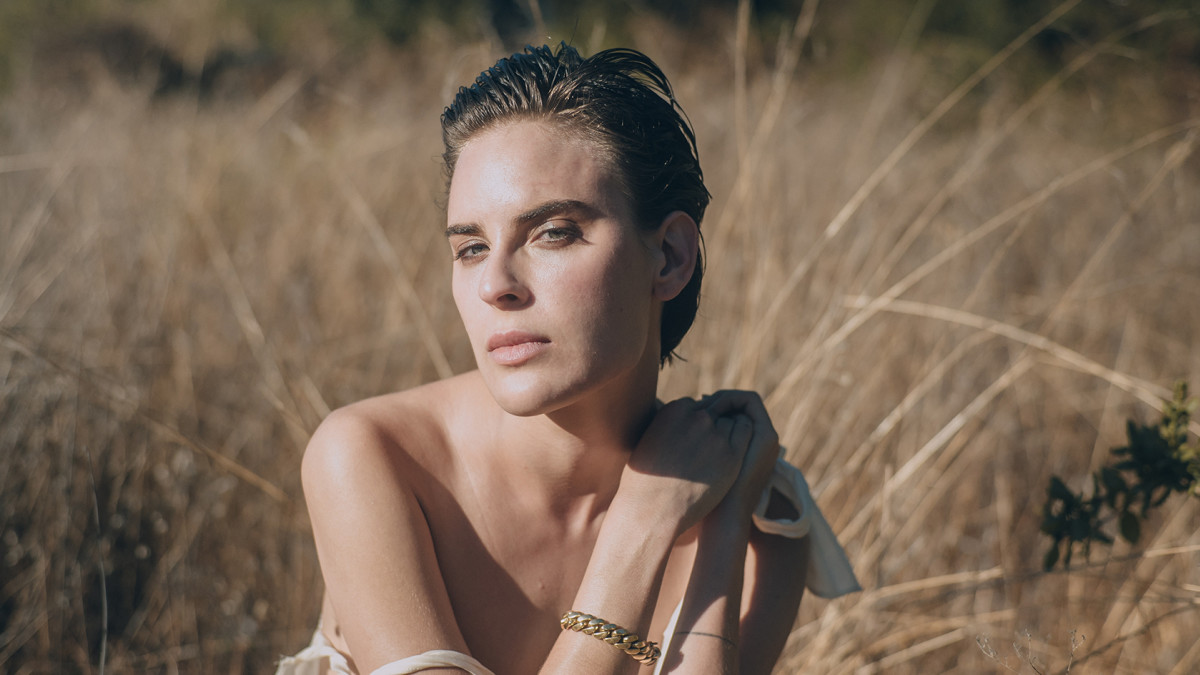
Wyllis Dress; 14K Gold Bracelet, Tallulah's own.
“I cope through shopping. I'm a big shopping addict. What is it, retail therapy? I subscribe heavily to it. I went from clothing to, 'What pots and pans do I buy?'”
TR: I love how you're so connected to and deeply affected by clothing. I think that's really interesting. Our lives have changed so much. We're not utilizing our wardrobes in the same way we used to. I went out the other day and was thinking, 'Why do my feet hurt?" And it literally was because it was the first time I'd put on a pair of heeled boots in a while. And they were block-heeled boots. Then, the other day, I was walking around and I got totally swept up by the Isabel Marant store. I went in and I bought a handbag and three pairs of earrings. I took a step back. "Where exactly am I....?'
TW: ...wearing this to? Yep. And I'm on the other side of it, trying to promote clothing and seeing where I should pivot, given the [pandemic] climate. We came out of the gate with party shoes. We launched during COVID, and I'm asking people to buy party girl shoes.
TR: It's temporary.
TW: I think there's an optimistic energy resurging. I cope through shopping. I'm a big shopping addict. What is it, retail therapy? I subscribe heavily to it. I went from clothing to, 'What pots and pans do I buy? What things for the house?' Dillon and I were laughing, because I was trying to explain my reasoning for buying this slightly more expensive fish-shaped sponge for the sink, and he was like, 'Okay, but we can just get a normal sponge?' I was like, 'But here's the thing, if I have the fish shaped sponge, I will be inclined to wash the dishes'. Because it's beautiful. It's a beautiful thing, and I love the beautiful things. At 26, I think you start to know yourself. I think you start to see these patterns really kick in. For me, if it's beautiful, or I think it's beautiful, I'll want to be involved with it, whatever that means.
"At 26, I think you start to know yourself. I think you start to see these patterns really kick in. For me, if it's beautiful, or I think it's beautiful, I'll want to be involved with it, whatever that means."
TR: You seem to be a very aesthetically sensitive person. How important are your surroundings to you being your most creative self? Do you pick up energy from a room?
TW: Oh my God. I am so sensitive to my surroundings. Energetically, I am very empathic. I've started to adapt a mild form of agoraphobia. It's not finished, but I finally got my home to look more like my brain. Now I don't want to leave, because it's safe. I can do it, but going to an office space or sitting at a table with a computer...that's not how my brain works. We have this couch that we call 'Blue Couch'. I'm currently sitting on it. It's the Restoration Hardware Cloud Couch, and it's modular, so you can configure it any way you like. I configured it as a giant square so you can fully recline on it. It's so comfortable, and I never want to leave. Every big major decision, everything I do is on Blue Couch. It's my office space because I want to be in my cozies. I want to be reclined. It's where I can be creative, because I can't be uncomfortable, not too hot, or too cold... I've decked it out in this time period. I have my little setup. I get very stuck in, 'This is what I need to really let my mind soar and go. I was in the office today, and I love going to our office downtown. You can get a lot of work done; there's a lot of fabric selecting. But the real design phase? It all happens on Blue Couch.
“Every big major decision, everything I do is on Blue Couch. It's my office space because I want to be in my cozies. I want to be reclined. It's where I can be creative, because I can't be uncomfortable.”
TR: Besides Blue Couch, where else do you feel most creative?
TW: I would say, when we have the time to go to Idaho. I think that there's a stillness there. It's so peaceful and calm and beautiful. There's just the echo of nature. I'm so inspired by earth, and structures, and rocks, and moss. That's all very present there. I can pull from that, and get into that place. It's just cozy, it's just home. I think I do the best when I feel safe, and when I feel close to people that I love.
TR: When you're in Idaho, is it more outdoors than indoors? Is there a place on the property that you love?
TW: It's already snowing there, so now if we go back we wouldn't be able to do as much outdoors besides a bundled-up walk. And you're sitting in the living room. And we have this crazy fireplace. It's made out of stone. The fire's going. There are these pinewood floors that have been there for decades. They're worn in. There are all these funny tchotchkes everywhere. My mom's decorated it with stuff everywhere, in the best way. In the living room is probably where I'm the most creative.
“I think I do the best when I feel safe, and when I feel close to people that I love.”
TR: You're really open about your mental health struggles, and your struggle with alcohol and drugs. We just talked about surroundings being important to being your best creative self. What about people? Who we surround ourselves with is so important. Have you had to cut people out of your life since becoming sober? Who do you choose to surround yourself with these days?
TW: Absolutely. In my journey of well being, which started with sobriety, but is continuing always, and ever-evolving, my group of people has really narrowed. That's something I'm quite grateful for, because I spread myself very thin. I was definitely a people pleaser. I was just grateful that somebody wanted to talk to me, versus having the self worth to think, 'Do I want to be around you? You're choosing me, but I don't know if I'm choosing you.' When I was able to shift that a little bit, be more comfortable saying no, express when I didn't like something, not sit in discomfort just because it was more polite---I found such greater room to breathe. I've had to say goodbye to some friends. I've had to, like I said, narrow the group. What's left are some really spectacular people. Also, when I had so many people around me my tank would get empty so often. Now I feel a little bit more capable of giving that energy to people who are deserving of it, who have earned that attention, because I am such a force of a friend. It's ride or die to the tenth. I will do anything for the people I love. I will literally do anything. I will show up. I will be there. But I was doing that for everyone I met, and that's just not sustainable. I added a person to the friend group. It is so cheesy, but I added myself. I was able to start trying to treat myself the way I treated all these people, and show up for that friend, that person.
TR: Can you pinpoint, Tallulah, the moment when you realized that you were feeling feelings in extremes?
TW: God, let me think. That's a good question. I'm trying to think back to the first, or big, moment. I remember being really, really young. I can't remember what the scenario was, or what was going on, but I remember feeling really aware of how my behavior or actions could affect somebody, and that it was important to me. That's something that has been really present for me since l was the littlest of ages. There was kind of a switch-on of consciousness, and when it happened, it was, 'I don't want to hurt their feelings.' That was very big for me, and has since carried on in my life, from when I was 3 years old. I don't want to upset someone. I don't want to hurt their feelings. I've always been very attuned to energy shifts and mood and other people. I really didn't like it, not just if I saw someone upset, but if I knew I caused it. I was very aware of learning to apologize, learning how to take responsibility. That was something that my parents taught us really early on.
“In my journey of well being, which started with sobriety, but is continuing always, and ever-evolving, my group of people has really narrowed. That's something I'm quite grateful for, because I spread myself very thin.”
TR: Do you believe that your use of alcohol and drugs was a way of dealing with undiagnosed mental health issues?
TW: Oh, absolutely. I really encourage and advocate for people who are feeling uncomfortable, to pull the thread a little bit and explore, because I didn't know any of my diagnoses until, I would say, concretely, until two or two and a half years ago. I've been told, based on what I've described, that I've had depression since I was 9. So to live that many years with significant depression and significant anxiety, levels of OCD, intrusive thoughts, all of that---and never have a name for it, for years and years, since I was a kid---was terrifying. You can't imagine that someone else understands it or feels the same way. I grew up right at the cut off, before social media really took off. Before Instagram. No one was talking about mental health. No one was saying, 'These are the signs.' You didn't have access to it. It was kind of like you just didn't talk about it.
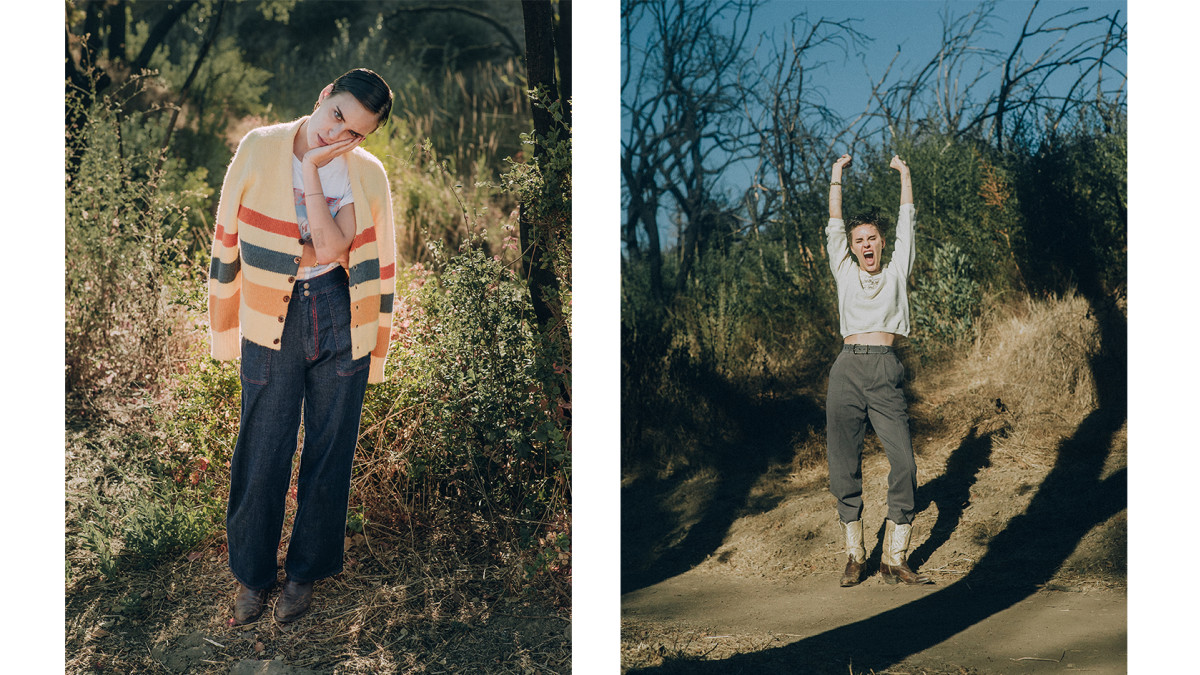
LEFT: Wyllis Shirt, Cardigan, Pant; Vintage Cowboy Boots, Tallulah's own. RIGHT: Wyllis Sweatshirt and Pant; Vintage Cowboy Boots, 14K Gold Bracelet, Tallulah's own.
TR: And you're this little child, figuring out how to deal with it. Is this the way it's supposed to be? You don't know.
TW: You assume. I believed truly, that this was life. It was only when I got to the point where I was in so much pain that I didn't want to be alive, that I was like, 'Not everyone can feel this way, because we wouldn't be here.' That's when I really started asking for help, because I knew, intuitively, that it was wrong; this was not the way that most people felt. Before that, before it reached that crescendo, and it was somewhat manageable, I really thought everyone felt this way, all the time.
“I will do anything for the people I love. I will literally do anything. I will show up. I will be there. But I was doing that for everyone I met, and that's just not sustainable. I added a person to the friend group. It's so cheesy, but I added myself.”
TR: How heavily were you drinking and doing drugs when you were at your worst?
TW: It's hard to quantify because my really acute using was very short. I've been drinking since I was 15 or 16 and in high school. I hit it fast and I hit it hard. I was not prejudiced about what I put in my body. I didn't care what it was, where I got it, who gave it to me. I just wanted to not feel the way I felt. So I was sort of like a garbage disposal. I was just throwing things in my body. There was this fleeing energy, this running. The moments when I was sober, I would feel it again. The main goal was to be disconnected. It was a lot. It was severe. It was extreme. I didn't understand that there were times in the day when you shouldn't drink. I genuinely was like, 'I'm awake. I don't know why I shouldn't have a beer at 7am'. I believe that there are levels of alcoholism that are genetic and wired into you. You just have an allergy. Your body can't comprehend it. I am someone who is an alcoholic so deeply, that I'm still an alcoholic in my other behaviors today. I'll go to In + Out, and I'll order two french fries because, God forbid, I'm still hungry.
TR: There's a backup french fries...
TW: The backup french fries. But I never eat the backup french fries, because the one fries is always fine. Yet, I'll always spend the $2.50 to get the second fries, in the same way that I thought, we need the 35 pack instead of the 6 pack. What if we run out? It's the feeling that the cup's never going to be full. I need to fill it more, because what if I'm still yearning for something? It's a hard feeling.
“I've always been very attuned to energy shifts and mood and other people. I really didn't like it, not just if I saw someone upset, but if I knew I caused it. I was very aware of learning to apologize, learning how to take responsibility. That was something that my parents taught us really early on.
TR: Was there an exact moment when you knew you needed help?
TW: There was. It was sort of an accumulation of moments. I remember that right before I got sober, I started to try to put up boundaries. I'm not going to drink this way. I'm not going to drink before this time. I'm not going to smoke this substance. I'm not going to buy it. I basically could uphold these 'rules' for two days. At first, I had sort of been able to mind-palace my way out of thinking I was hurting people. They were saying, 'You're hurting me. This is scary', and I would just somehow wiggle my way out of taking responsibility, saying, 'You're upset. I'm fine.' I went into treatment. I went into rehab thinking I didn't really have a problem. I knew I had a problem, but I went into treatment thinking it wasn't that bad. I thought everyone was overreacting. I do remember that I got sober on July 7th, 2014. A couple days before I got sober, it wasn't fun. It wasn't a good time. I wasn't partying with friends, and just getting out of control. It was feverish. I was fully medicating myself because I wasn't properly medicated. It was a really scary place to be in because I justified my behavior due to how much pain I was in. The long-winded way of answering your question is, the moment I recall, is being hungover, I'd been lying to my mom, I had been lying to my sisters. You're holding up so many different lies. And I had a moment of clarity. I knew that this wasn't right and I needed help. That was July 7th. I called my mom and I said, 'I need help. I need to figure this out'. And I did. I haven't done a drug or drank since.
TR: Congratulations.
TW: Thank you. To get sober so young... I mean, I've never had a legal drink. Never will, hopefully. I got sober at age 20. It created a real impact; and I'm still unpacking how much it affected me. To make such a heavy life decision so young, being in my early sobriety during my early twenties, I was still figuring out friends, or college, and having social experiences. I was taking this huge step. Now it's kind of equaled out, but it was a hard couple of years, making a decision that seemed very counterintuitive to what you think a 22 year old should be doing.
“I had a moment of clarity. I knew that this wasn't right and I needed help. That was July 7th. I called my mom and I said, 'I need help. I need to figure this out'. And I did. I haven't done a drug or drank since.”
TR: Do you believe in inherited trauma?
TW: I do. I do. Generational trauma is very real. I think we hold more than we realize. Many people are absorbing their environments more than they realize. I'm a real believer, particularly with mothers and their daughters, that if you're struggling with your body or yourself, or the way you look, you don't even have to say it. Children will pick up on it and take it in. That's something that if and when I become a parent, I want to be very aware of.
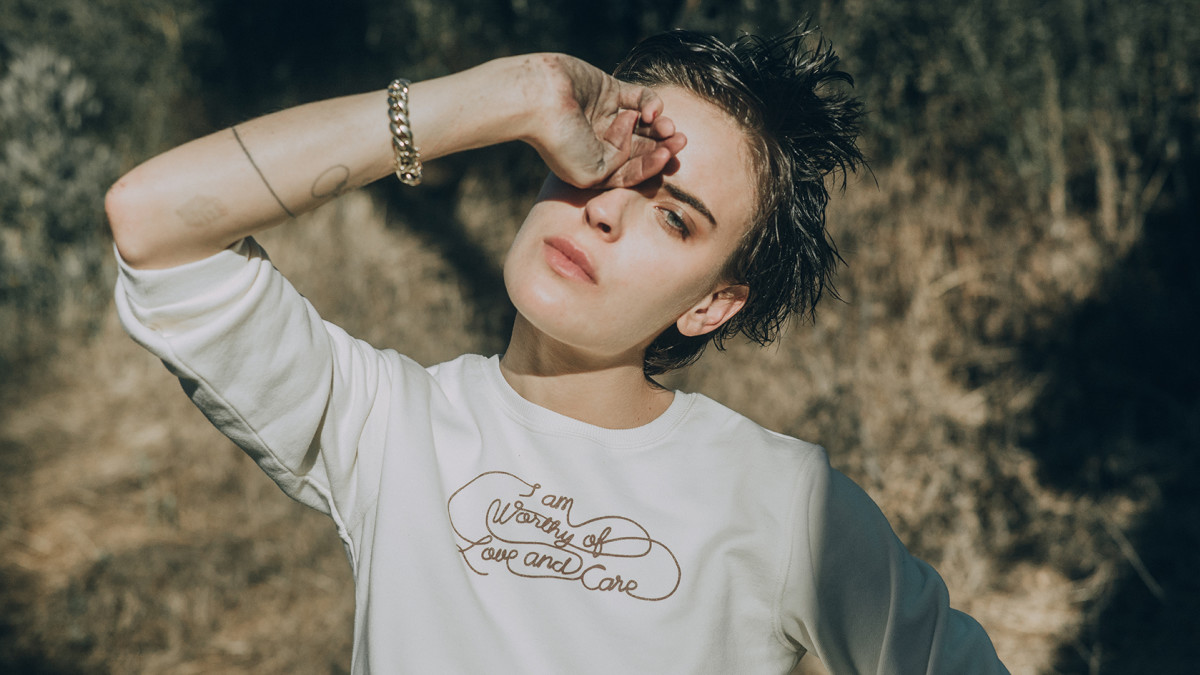
Wyllis Sweatshirt; 14K Gold Bracelet, Tallulah's own.
TR: Has it been hard to find the right therapist? Having the right therapist makes all the difference, doesn't it?
TW: Absolute game changer. It's taken me a couple of tries, and I now have a great team around me. I think that finding a good therapist goes hand in hand with getting to know yourself a little more. There are some people who truly thrive and succeed with tough love, and need someone who's going to hold them accountable. I am not someone like that. I will shrink into a tiny ball if someone even remotely changes their tone with me. I needed to find someone who was gentle. Also, it took me a while to realize I really needed a woman. That was really important to me. But any kind of professional help you can get is amazing, I know that therapy is a privilege, and I know that even choice in therapist is a privilege. So if you can get your hands on someone who will listen in a professional capacity, that's amazing. If you do have the room to select someone, it helps to have a better idea of how you operate. I've been in therapy when it wasn't working, I thought it was, and I was getting nowhere. Find someone who really fits your way of thinking. And it's okay if you've tried someone and they don't totally fit you. Breaking up with a therapist is very weird, but it's also very important because it's like any non-working relationship, if you stay in it just for the sake of staying in it, who is it benefiting?
“I really encourage and advocate for people that are feeling uncomfortable to pull the thread a little bit and explore, because I didn't know any of my diagnoses until, I would say, concretely, until two or two and a half years ago.”
TR: How did becoming sober sharpen up your creativity?
TW: It busted it wide open. For me, my creativity is a direct outlet for my emotions. I was not comfortable holding my emotions. So when I was forced to confront them six years ago, I'd really sit with my feelings. It allowed me the starting point to sort through, figure out, and understand how to see the beauty within a painful moment, and see the beauty in how much capacity I have to feel. I chose the medium of apparel, as an emotional person, wanting to create the marriage of the emotional process with clothing, and see clothing as something deeper than a status symbol or shelter from elements, and as a true medium of expression. Even starting with the sweatshirts, and some of the slogans on them, the language that I wanted to put out there---was really important to me, and really close to my heart. One of my favorite things we did is a sweatshirt that says, 'I'm uncomfortable in my own skin.' That's a very honest statement. I felt like if people were brave enough to buy it, wear it on the street, wear it in their home, or to a friend's... it would invoke conversation. It's a loud statement, but it's a loud feeling too.
TR: How do you stay so connected to social media, but tune out the bullies and the negativity when it comes your way? Have you learned any tools for straddling that delicate line?
TW: One of the things I really like to do is not look at the comments. If I put something out there, and it depends on my mood and my sensitivity level at the time, I will post, and then fly away. It is an amazing tool for connecting with people, especially in those moments where I've posted more vulnerable things. It's also a necessity when you have a clothing line in this day and age. You've got to be on it. It's a necessary tool. But I go in and out. I'll see a mean comment, and just delete it, and then get off for a little bit.
“Find someone who really fits your way of thinking. And it's okay if you tried someone and they don't totally fit you. Breaking up with a therapist is very weird, but it's also very important because it's like any non-working relationship, if you stay in it just for the sake of staying in it, who is it benefiting?”
TR: You create some of the art for your pieces, right? I also read recently that your style inspo was '90's off-duty ballerina'. Do you have a place where you keep all your ideas? Are you a mood board kind of person?
TW: I'm not. It's crazy; I haven't figured out a way to get it all out of my head. It's all bouncing around in my head, 24/7. I'll have an idea, and write it down in the Notes section of my phone. My laptop broke seven years ago and I never got a new one.
TR: You're kidding?
TW: I don't have a computer, and I've sort of adapted by doing everything on my phone. I have insane amounts of photo albums in my phone. I'm a grandma with technology. I'm sure there's a way I could do this easier, but it just works for me. I have multiple folders of inspiration on Etsy. I have multiple folders of phone photos. It's all very haphazard, but I can sort it out. That's the other thing, I've always tried to fit myself in... a square peg in a round hole...in every way. I wanted to be the girl who woke up and went on a hike. I wanted to be the person who made a smoothie in the morning. I wanted to be the person who had a journal for writing down feelings and ideas. I'll buy the journal, buy the nice pen, do it for one morning, and then the pen and the journal get covered in dust somewhere, and I'm back to the phone. I started accepting where I was at and how I work, and that I might just be someone who likes to gremlin on the couch, and go on my phone, with a hunched back, and design. I don't design by sketching. I design by inspiration. I design by curating pieces from the past and reinterpreting them. I had to accept that it is, in fact, a style of designing. In the beginning I thought, 'I'm a fraud. I'm calling myself a clothing designer, but I'm not.' When I accepted that this was my mode of expression and I stopped judging it, it became much easier. 'Why am I holding this big backpack of rocks, climbing up this hill, when I can just take it off?'
“I hit it fast and I hit it hard. I was not prejudiced about what I put in my body. I didn't care what it was, where I got it, who gave it to me. I just wanted to not feel the way I felt.”
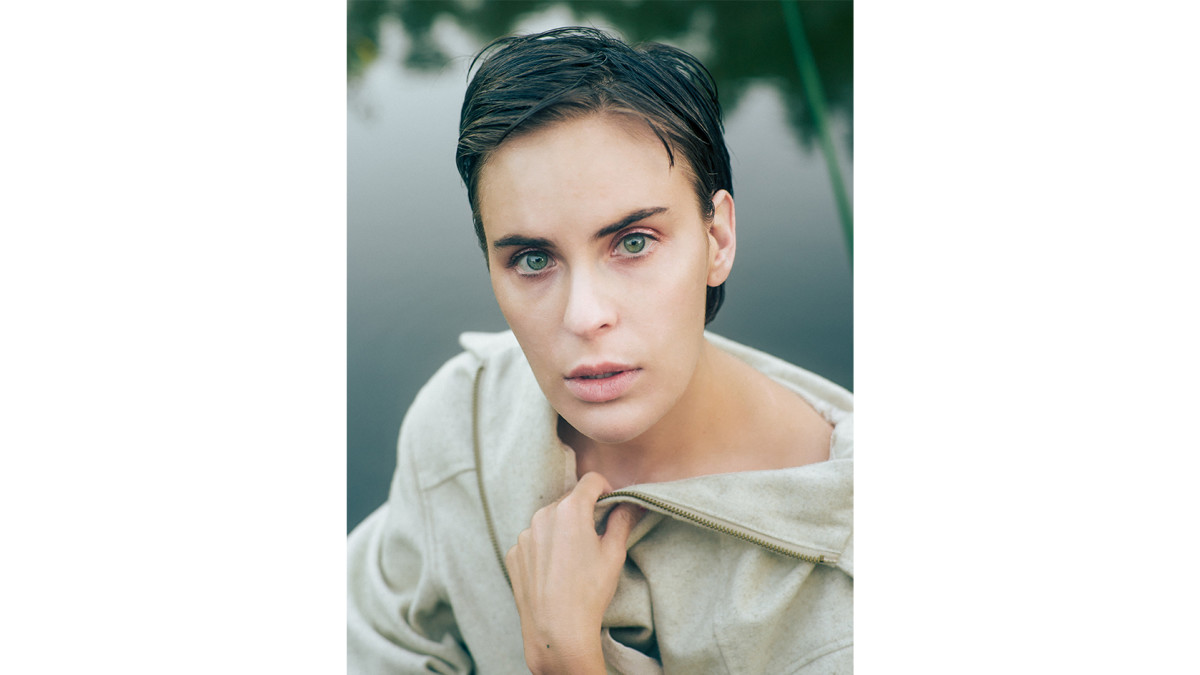
Wyllis Jacket and Pant; 14K Gold Bracelet, Tallulah's own.
TR: I know you look at fashion and getting dressed as having the potential of being a mood booster. Talk to me about your closet. What does it look like? Do you put a lot of care into it?
TW: My closet is so chaotic right now! My closet has been in multiple areas in my home. I have this giant, kind of bonus room, at my place. It doesn't have a bathroom, so it's not a bedroom, it's just this giant room. I've tried to figure out what my closet is. I have two bedrooms, so at one point my closet was the second bedroom. Then I moved it. Then it was the front room. Then we moved it back. Right now, my clothes are in three different places and it's quite chaotic. Thank god I'm only in sweatpants right now, because getting dressed is kind of a nightmare. But it is the fantasy and the dream to have the decked out closet.
TR: You're going to feel so good when you get it to that. I'm excited for you.
TW: I've had consults with California Closets, Container Store...about what to do. Right now it's about five rolling racks, two industrial shelving units, and this set of drawers. It's chaos.
TR: It's fun chaos though.
TW: It's fun chaos, and I love it, it's my collection. I'm constantly going through the closet. I just put half of my clothes into storage bags in the closet that is kind of my archive because they either have been worn too much, or we don't need them right now, or they are fragile and you need a pause. It's just constantly evolving. I also think I'm very manic and I'm very quick. I make decisions very quickly. That's why I shaved my head. That's why before I shaved my head, I had bleached blonde hair. I very much think hair can dictates so much of an outfit. It sets the tone, the mood. In different stages of the hair I've had, it also matches my vibe.
TR: What's your hair vibe now?
TW: The hair vibe right now is a little Helena Bonham-Carter in Fight Club. Which is fun, but it's also a weird hacker guy in a 90’s movie. I vowed to myself that I wasn't allowed to dye it after I shaved it, because that's why I shaved it in the first place, it was so dead and broken. I love dying my hair. The smell of dyed hair soothes me. My mom and my sister Scout are in a war of who can have the healthiest, longest hair. When you are in the game, you're in the race with the long hair. I get it. If I had long hair, I'd probably never do anything to it. But they have the patience that I don't have. I would have chopped it, cut it, dyed it…
TR: You get hair impatient.
TW: I get hair impatient. But they have gorgeous hair, so it inspires me to have the healthy, non-dyed, mane of hair.
“It allowed me the starting point to sort through, figure out, and understand how to see the beauty within a painful moment, and see the beauty in how much capacity I have to feel. I chose the medium of apparel, as an emotional person, wanting to create the marriage of the emotional process with clothing, and see clothing as something deeper than a status symbol, or shelter from elements, and as a true medium of expression.”
TR: You’ve said you came into this world being an observer. Why do you think that is? And how has that helped you with Wyllis?
TW: I always felt that I watch, absorb, take in information, and then take action. Which is contrary to the fact that I'm also very impulsive and impatient. At any given moment, I'm clocking the feelings of the five people in the room, the dynamics between everyone. Is everyone okay? How are they feeling? What's the mood? What's the temperature?. And then I'm an alcoholic. I would like to do the thing, so can we do the thing right now? Let's do the thing today! This moment! Let's do it! With Wyllis, being an observer has helped me make certain decisions. I could have started a clothing line with no thought to inclusive sizing, no thought to price point. I could have made it very, very limited in terms of who could buy it. But because of the experiences in my life and the kind of person I am, that was non-negotiable. I knew Wyllis needed to be an extension of me. I always want to be a soft, safe landing pad, a really kind, gentle soul that wants people to feel good. I think that those kind of observations really helped put into motion the blueprints for what the brand is now.
TR: How did you know it was the right time to create the line?
TW: I knew I wanted to do it. How do we do it right now? But I didn't know how to do it. Then I connected with [brand manager] Rachael, and she knows what's up. I had all these ideas, it was like a car that had been revving for fifteen years. I had no idea which direction it could go. I really have to always give so much credit to our collaboration and what she continually brings to the table. I'm very metaphorical and I'm very visual. I feel like I birthed these screaming wet, messy blob babies of ideas that are just leaking everywhere and squishy. She knows how we clean it up, how we refine it, how we make it happen.
TR: Were you intimidated at all about getting started? You had to teach yourself. I know what that's like. You have to set your sights on this goal, and then teach yourself how to get there. But luckily, you had Rachael as a friend and someone who could help you do that.
TW: Absolutely, but I was quite scared. I was very, very nervous. I had been talking to people for around a year, loosely, about wanting to start a clothing line. At certain dinners I would tell people that I wanted to start a clothing line. And I wasn't confident in it, but I would throw it into the conversation. I was constantly being told it was a lot of work, takes a lot of money. Those things are both true. I was so scared. I felt like everyone had talked me out of it. I even talked to designers who told me it wasn’t fun, it was very difficult. In conceiving of Wyllis, I also tried to think about how I make this work for me. I really wanted to pinpoint what the goal was. For me, it wasn't New York Fashion Week. It wasn't having a brick and mortar on Rodeo. I didn't need to be that. That was okay. There was a fight for that spot already happening, and I didn't need to be in that. What I wanted to do is impact people. I wanted to make people feel safe, I wanted to make people feel seen and heard, and beautiful. That was the goal. I also have the awareness that it's very rare that something pops off overnight. You have to nourish it, you have to go with the flow and learn as you go.
TR: Bobbi Brown said to me she always tells young entrepreneurs that it’s about the now, and to really be present in what you're doing, day to day, as you're building it. When you were formulating the concept of mental health messaging in a line of fashion, it was really because you wanted to fuse yourself into this collection.
TW: That was 100% the goal. I wanted to put my signature on what I was doing, without physically putting my signature on what I was doing. I wanted to take up the space of conscious clothing. People are doing it in terms of sustainability, and that's their route. There are so many beautiful, vital issues that are at hand right now. I’ve always felt very uncomfortable speaking out about things that I haven't personally experienced. I don't think that means that they are any less important, but it just never felt authentic to me to back something I didn't know, and I couldn't talk about.
“I could have started a clothing line with no thought to inclusive sizing, no thought to price point. I could have made it very, very limited in terms of who could buy it. But because of the experiences in my life and the kind of person I am, that was non-negotiable.”
TR: How do you design for all sizes? Are there techniques that you use to make sure a piece looks great on all bodies?
TW: We have two fit models, one extended sizing, one in straight sizing. We fit each piece on both the models. It's been really wonderful to speak with the models, if I'm in the office during a fitting, I really want to get their feedback. I don't just look at them as bodies we're pinning clothes on, silently. Designing clothes for a body that is not mine is an interesting thing, because I know what looks good on me, I know what I feel good in, but I can't know what it feels like to be in a different body. I don't want to assume that this is the shape, or this is the style, or this way is the best way. I don't know everything, and I'm really aware that there are things that I'm learning. Rachael has been doing both straight and extended sizing forever. She really has it locked in the best way to make it happen. I think why people don't do it across the board is because, essentially, you're designing and paying for two different clothing lines. You have to get two different patterns, two different samples, fit in two different ways. That was something that was explained to me, but I said from the beginning I'd rather have less pieces that more people can wear, than have anyone say, 'I love it, but it doesn't fit.' Or, 'It's too expensive'.
TR: How do you envision your pieces helping people exactly?
TW: I imagine that 14 year old, 15 year old me, wishing I’d been able to find a piece of clothing that could speak for me. I didn't have the voice to say ‘I'm uncomfortable. I don't feel good.’ One of my favorite things we did was the "Yeah, I'm Fine" sweatshirt. That's me. I've said that so many times. And you're not, I wasn’t. I think I would have felt I wasn't alone. I didn't know if people would get it, but I thought maybe if one person did, if one person saw it and said, ‘Wow, I'm feeling that way too,’ we could heal the feeling that we’re all not alone in this.
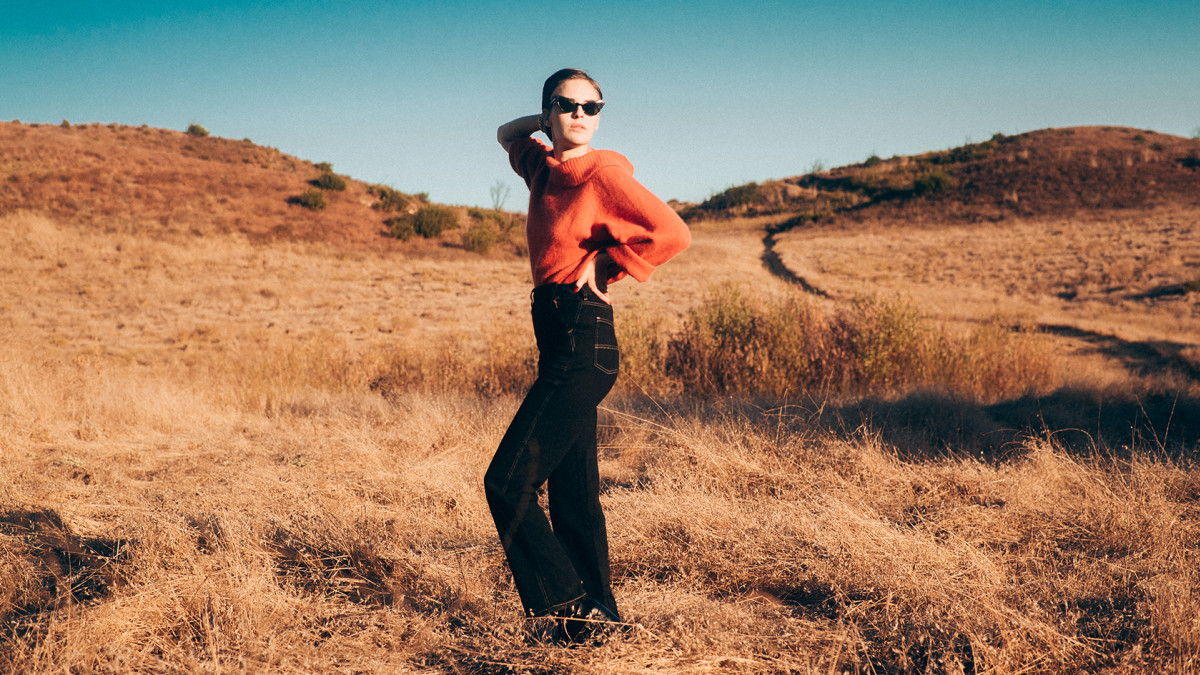
Wyllis Pant; Vintage Sweater, Sunglasses, and Cowboy Boots, Tallulah's own.
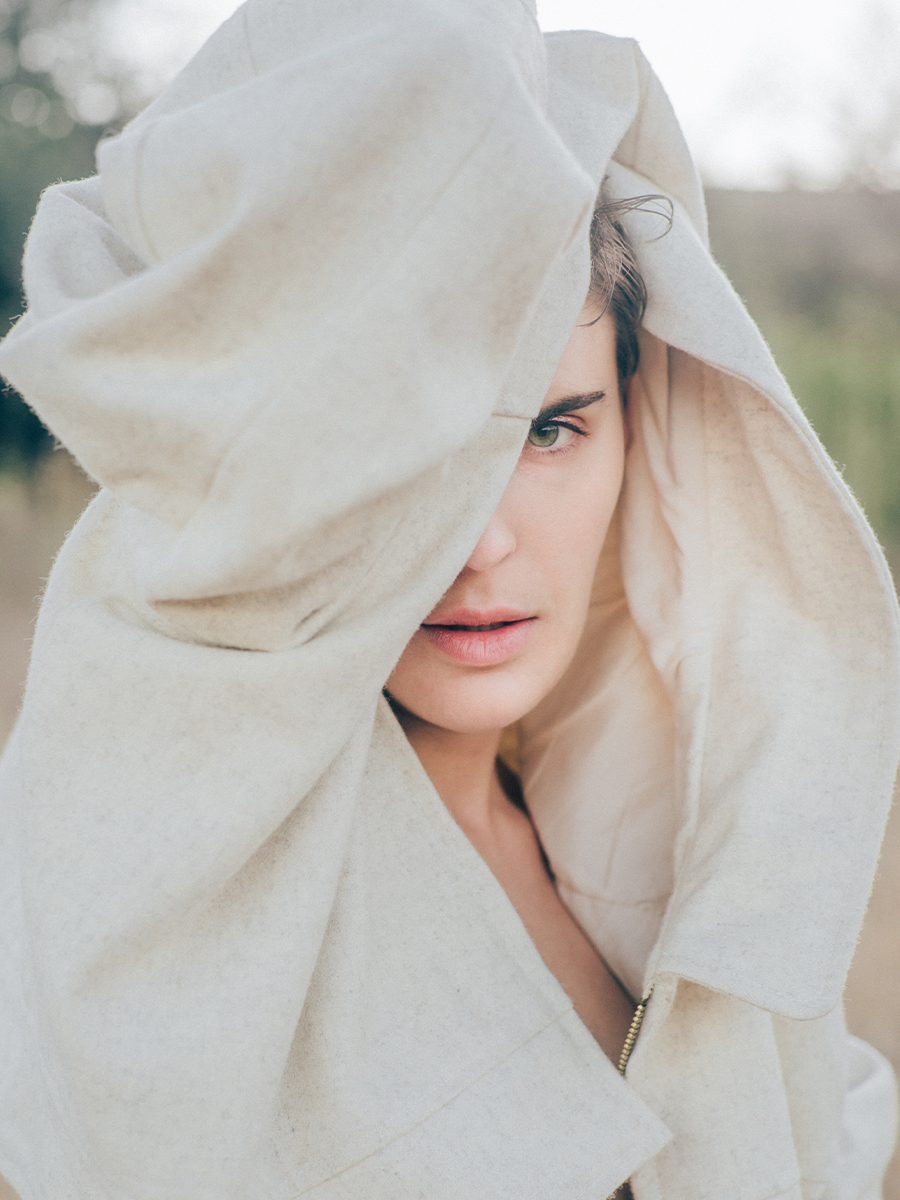
#BTS
NOVEMBER 2020 COVER
TALLULAH WILLIS
LOCATION
MALIBU, CA
PHOTOS + VIDEO
DILLON BUSS
STYLE ASSISTANT
REBECCA KAHANE
MAKEUP
AMY ORESMAN
A-FRAME AGENCY
MANICURIST
CHI PHAN
CLOUTIER REMIX
"Our Leonard Pant in white is my current favorite Wyllis piece."
"Jillian Dempsey has an eyelid tint in this reddish rouge color. I love it. And it's so quick and easy."
"Right now I'm using Aesop conditioner, just because it smells so good."
"Tata Harper has the most amazing body oil to put in the bath."
"The candle I burn at home is Diptyque Feu de Bois."
"I'm about to re-read one of my favorite fantasy fiction series called Court of Thorn and Roses. It is about elfin people doing sexy stuff."
